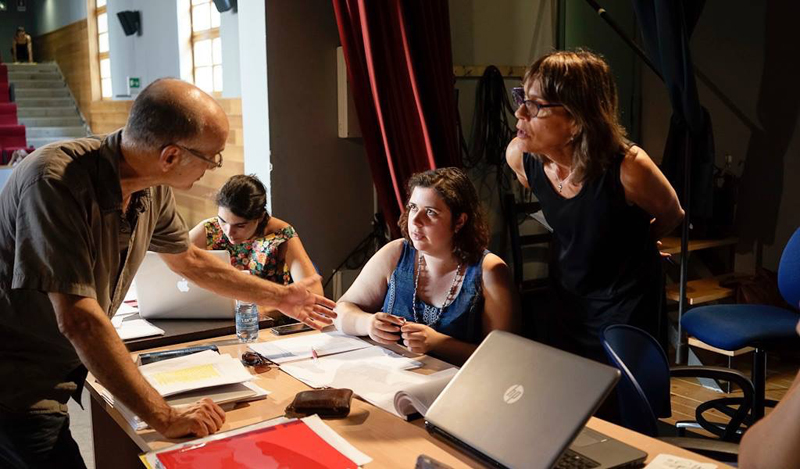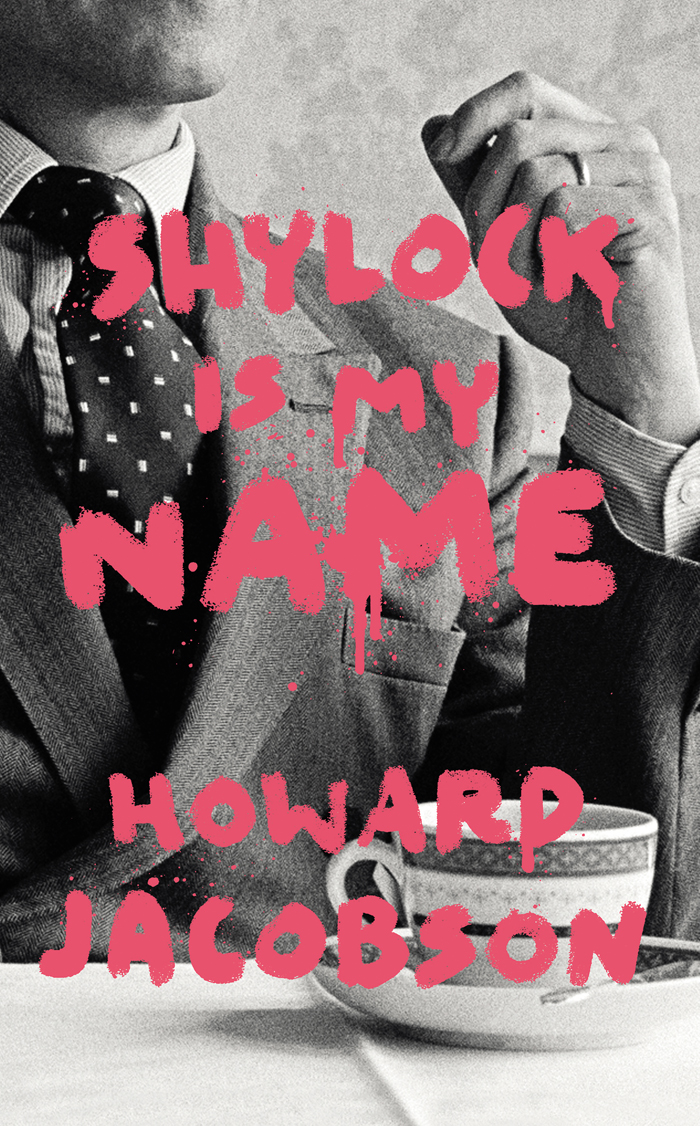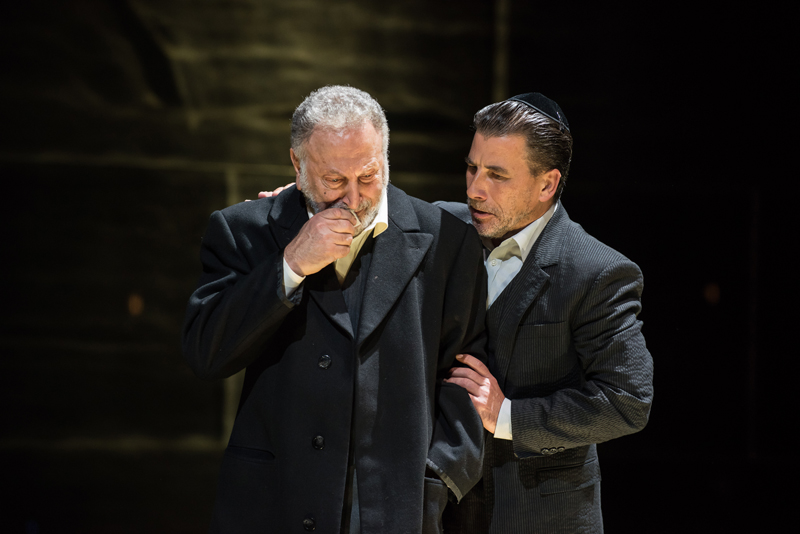In the next of our chats with members of the cast and creative team of the very first production of The Merchant of Venice to be staged in the Venice Ghetto itself, Judi Herman talks to Welsh actress Jenni Lea-Jones, who has relocated to Venice and is perhaps the most unusual of the five performers sharing the role of Shylock in the show they are calling The Merchant in Venice. Apologies for the quality of the line at the start of this conversation, which happily soon improves.
JR OutLoud: Frank London talks to JR about composing for The Merchant in Venice at Venice Ghetto 500
In the next of our chats with members of the cast and creative team of the very first production of The Merchant of Venice to be staged in the Venice Ghetto itself, Judi Herman talks to Frank London, composer and musician. The Grammy-winning trumpeter and composer, founder of the Klezmatics and leader of bhangra/Yiddish group Sharabi (with Deep Singh), Shekhinah Big Band, and his Klezmer Brass Allstars is no stranger to large-scale collaborative projects, or of course to Jewish-themed work. Here he talks about the musicians who are working with him on this project and his inspirations for the music that will be heard in the Ghetto.
See Alexandra & Nikole Stoica, the twin violin virtuosos from Romania that Frank talks about, who will play in the production: www.youtube.com/watch?v=jmg-mPSAeCE
Hear music by Salomone Rossi (his beautiful Kaddish – the mourner's prayer), the 17th-century, Italian-Jewish composer, who was one the inspirations that Frank mentions: www.youtube.com/watch?v=aBBXYsdt8Jk
JR OutLoud: Davina Moss talks to JR about her role in the production they're calling The Merchant in Venice at Venice Ghetto 500
 An update from Italy: Davina Moss writes:
An update from Italy: Davina Moss writes:
"Rehearsals are going well! We’ve gone from table work to staging and it’s important to figure out the geometry of the space. Everyone is very excited with how the project is progressing and we’re making some very cool discoveries in the rehearsal room. In this photograph you see us debating over a line in the trial scene, which different versions of the play have different wordings for."
As the celebrations to mark the 500th anniversary of the Venice Ghetto continue, excitement mounts over the first ever performances of Shakespeare’s The Merchant of Venice in the Ghetto itself (26-31 July). In the next of a series of interviews with members of the cast and creative team, JR's arts editor Judi Herman talks to Londoner Davina Moss, currently studying dramaturgy at university in New York, to find out more about her role as assistant dramaturg on this unique production.
Visit www.themerchantinvenice.org for more info.
JR OutLoud: In light of Venice Ghetto 500, actor Michelle Uranowitz talks to JR about playing Shylock's daughter as part of the anniversary celebrations
As the celebrations to mark the 500th anniversary of the Venice Ghetto continue, excitement mounts over the first ever performances of Shakespeare's The Merchant of Venice in the Ghetto itself (26-31 July). JR's arts editor Judi Herman will be talking to various members of the cast and creative team in the coming weeks, but first spoke to American actor Michelle Uranowitz about playing Shylock's rebellious daughter Jessica in Venice.
Visit www.themerchantinvenice.org for more info.
Review: Shylock is My Name – Howard Jacobson’s gift for comedy glisters pure gold
 Howard Jacobson was writing J, a novel about a dystopic (non-) Jewish future, when publisher Hogarth invited him to join a relay team retelling Shakespeare in contemporary settings. He was assigned The Merchant of Venice – an inspired choice that allowed him to tell the story from Shylock’s perspective. But Jacobson’s blinder, proving again his extraordinary inventiveness, is to have Shylock slip into present-day Cheshire to share the narrative with his 21st-century counterpart Simon Strulovitch, and chew over his own story as told by Shakespeare.
Shylock arrives without fanfare as the story opens, not in Venice but in a bleak Jewish cemetery in Manchester, the city where Jacobson was raised. He is communing with his long-dead wife Leah, “buried deep beneath the snow”. So Shylock engages the reader’s sympathy: within this take on the play is a meditation on loss, as well as scabrous satire on the materialistic celebrity denizens of Cheshire’s ‘Golden Triangle’.
Howard Jacobson was writing J, a novel about a dystopic (non-) Jewish future, when publisher Hogarth invited him to join a relay team retelling Shakespeare in contemporary settings. He was assigned The Merchant of Venice – an inspired choice that allowed him to tell the story from Shylock’s perspective. But Jacobson’s blinder, proving again his extraordinary inventiveness, is to have Shylock slip into present-day Cheshire to share the narrative with his 21st-century counterpart Simon Strulovitch, and chew over his own story as told by Shakespeare.
Shylock arrives without fanfare as the story opens, not in Venice but in a bleak Jewish cemetery in Manchester, the city where Jacobson was raised. He is communing with his long-dead wife Leah, “buried deep beneath the snow”. So Shylock engages the reader’s sympathy: within this take on the play is a meditation on loss, as well as scabrous satire on the materialistic celebrity denizens of Cheshire’s ‘Golden Triangle’.
For Jacobson, the beating heart of Shakespeare’s Shylock is not in the defiant speeches he throws in the faces of the Christians who bait him, but in his response to the news that his errant daughter Jessica has exchanged his ring for a monkey. “I had it of Leah when I was a bachelor. I would not have given it for a wilderness of monkeys.” Around these lines Jacobson builds his case for Shylock in love, bereaved – and the lone parent who cannot give his daughter what she needs.
Strulovitch, visiting his mother’s grave recognises Shylock and invites him home. And so begins their relationship, played out in a succession of conversations, the pair ensconced in armchairs, cradling brandy, comparing notes on errant daughters, discussing every move and motive and most of the dialogue that drives Shylock in Shakespeare’s play. They analyse the contradictions driving Strulovitch, “a rich, furious, easily hurt philanthropist with on-again off-again enthusiasms”, and the butt of antisemitism, above all from the effete aesthete D’Anton (Jacobson’s Antonio) a rival art collector,Strulovitch, visiting his mother’s grave, recognises Shylock and invites him home. And so begins their relationship, played out in a succession of conversations, the pair ensconced in armchairs, cradling brandy, comparing notes on errant daughters, discussing every move and motive and most of the dialogue that drives Shylock in Shakespeare’s play. They analyse the contradictions driving Strulovitch, “a rich, furious, easily hurt philanthropist with on-again off-again enthusiasms”, and the butt of antisemitism, above all from the effete aesthete D’Anton (Jacobson’s Antonio) a rival art collector who has made smiling sorrowfully at his own Weltschmerz into an art form.
As in the play, the Christians revel in their antisemitism, even vying to top each other’s ‘Jewpithets’ by referring to Strulovitch as “moneybags”, “thick-lips” and “hook-nose”. Strulovitch is arguably worse off than Shylock: his wife is trapped by a stroke in a useless body. His daughter Beatrice, of an age with Jessica, is vividly present, though her father dreads her frequent absences as she threatens to spend the night with a succession of unsuitable men – none of them Jewish, of course. Jessica is absent from the novel, because Jacobson has Shylock caught as if in aspic at the end of Shakespeare’s story. As Shylock says, for him there is no Act Five (his last appearance is leaving court in Act Four).
Jacobson’s gift for comedy glisters pure gold as he makes merciless fun of the self-obsessed celebs surrounding his Portia – a reality TV hostess and plastic surgery addict called Plurabelle, whose full name is Anna Livia Plurabelle Cleopatra A Thing of Beauty is a Joy Forever Christine. And there’s more fun with names. Enter Gratan Howsome, politically incorrect footballer of little brain with the hots for Jewesses, and hunky but vacuous arm-candy Barnaby, Plurabelle’s squeeze and D’Anton’s protégé.
If you know your Shakespeare you’ll hug yourself as you work out Jacobson’s deliciously witty reworking of his plot lines. In a twist on the casket scene, Plurabelle tests her suitors by having them choose between her three cars – a Merc, BMW or humble Beetle. And circumcision is central to an ingenious if potentially grisly plotline. Jacobson plunders his source text and other authors for quotes, sometimes bending their words, always putting them to great use. He grants Shylock his Act Five, calling his last chapter just that. But even this may not be his final act, for if he is Strulovitch’s Shylock, who is to say where he has appeared before or might appear again? Hogarth’s commission is a gripping addition to Jacobson’s writing on what it is to be Jewish.
By Judi Herman
Shylock Is My Name by Howard Jacobson, Hogarth Shakespeare, £16.99. Read Judi Herman's interview with Howard Jacobson over on the JR website, first published in the January 2016 issue of Jewish Renaissance.
Howard Jacobson will talk about his book at Jewish Book Week on Sunday 28 February, 5pm, at King’s Place. www.jewishbookweek.com
Review: On her third helping of The Merchant of Venice, Judi Herman has a discomfiting but enthralling evening
Don't let the buggers grind you down. Try to come over as laid back. They wear a strange eclectic mix of what they see as achingly trendy, or sharp city wear, set off with flamboyant footwear in bright – too bright – poster colours. So wear a dingy blouson over an old cardigan and keep your dignity, simply wipe off their spit when they show their contempt for you. This could be what's going through Shylock's mind in Makram J Khoury's finely calibrated performance, which positively radiates a relaxed gravitas.
It is to be hoped that Khoury, the popular, award-winning Palestinian-Israeli actor didn't base it too closely on his experience as a man caught between two worlds in his native country. Certainly when Christian Venice shows its contempt by spitting on Shylock's "Jewish gabardine", the gasp of horror that runs through the audience is even more of a shock wave than the similar audience reaction when this treatment is meted out to Jonathan Pryce's dignified Shylock at Shakespeare's Globe.
Khoury’s trajectory is frighteningly clear here, from distracted father outraged by his daughter Jessica’s's elopement and her profligate spending and disregard for her dead mother's ring, to vengeful would-be killer. Given the special disgust displayed towards him by Jamie Ballard's alarmingly volatile Antonio, it's hardly surprising he seizes the opportunity to whet his knife and prepare his scales in open court, now entirely indifferent to what the hostile Christians make of his behaviour.
This is the third time this year that I have seen this problematical play and each time I am struck by how little stage time Shylock shares with Jessica. Shakespeare magnifies the awkwardness of what today would be dubbed their dysfunctional relationship by showing so little of it onstage. And, in the few moments they do share together, Jessica is in turmoil over her imminent elopement and the need to deceive her father to make her escape. Here director Polly Findlay and designer Johannes Schültz trap Scarlett Brookes’ awkward, gawky Jessica at an impossibly high window in her father’s house. So there even less connection as he leaves for the dinner with his new creditor Bassanio that will give her the window of opportunity she needs to escape with her Christian lover Lorenzo (James Corrigan), as well as her father’s jewels and ducats.
Indeed Findlay, sharing her vision with Schültz and costume designer Anette Guther, builds an especially alienating dystopic Venice, where it’s easy for the audience to share Shylock’s discomfiture. Belmont, wealthy heiress Portia‘s nearby estate, similarly offers little in the way of refuge, even to its owner and her chosen guests from the city, let alone the foreign suitors at whom this Venetian lady pokes fun. The audience is reflected in the huge brass mirrored wall atop which Jessica appears and there is nowhere to hide on a thrust stage with only a mysterious (and perhaps more distracting than hypnotic) pendulum on which to rest the eye, joined briefly later by three symbolic ‘caskets’ lowered from above.
There is certainly nowhere to hide in Venice or Belmont, from creditors in the city, from the whim of a dead father, controlling his daughter’s choice of husband from beyond the grave. And there is nothing to distract from the actors, who first take the stage from seats on Brechtian benches at the rear. If anything, Guther’s flamboyant, jarringly disparate costumes are the set dressing. Patsy Ferran’s intelligent Portia might be grateful to don sober lawyer’s garments, after the hard poster colours of the little shift dresses that seem to be current Venetian jet set fashion here.
There is, though, a shock awaiting her at court. For at the centre of Findlay’s reading of the play is what turns out to be a love triangle, where Portia sees what the audience has known from the start – she must share her new husband Bassanio (Jacob Fortune-Lloyd) with Ballard’s tortured (and I don’t mean by Shylock), depressive Antonio, who claims him with a desperate kiss as he awaits his fate. It certainly makes sense for Portia to channel her discomfiture and anger into her inspired and literally blood-chilling case against Shylock. So this ‘comedy’ becomes even more of a problem play, if Portia and Bassanio’s wedded bliss looks uncertain before their marriage is even consummated.
Meanwhile, Khoury’s now coldly focused, implacable Shylock makes the most of his day in court, almost whetting his knife on Antonio’s bare chest. No wonder Antonio screams and cringes. And though Shylock loses everything, he is perhaps more incredulous than broken and makes it clear that playing for sympathy - from court or audience – is beneath him. Even he is upstaged by a tsunami of banknotes raining down on the court – effective but perhaps heavy-handed symbolism.
By the time Portia and her faithful waiting gentlewoman Nerissa (an especially warm and literally supportive performance from Nadia Albina – these girls are close) return to Belmont, Jessica and her Lorenzo do not look entirely comfortable with each other either. Jessica seems almost aggressive as she and Lorenzo top each other with their references to pairs of mythical lovers who might have shared such an enchanted night as theirs, alone on Portia’s estate while its mistress is away at court. The magic should have been enhanced by a floor gradually lit by candle after candle filling the stage, the effect doubled by that mirror wall. But their brash brightness is too obvious a visualisation of Lorenzo’s description of "the floor of heaven thick inlaid with patines of bright gold"; the patina on the brass of that mirror would have done nicely. Perhaps the only real beauty in the evening is provided by the choristers, "young-eyed cherubim" indeed, to quote Lorenzo again, singing Marc Tritschler’s unearthly plainsong from the heights of the set. It’s a particularly discomfiting and alienating reading of this difficult play and though the creative vision is clear, it is perhaps too much of a straitjacket for the drama.
By Judi Herman
The Merchant of Venice runs until Wednesday 2 September (broadcast live in cinemas on 22 July). 7pm & 1pm. £5-£60. Royal Shakespeare Theatre, CV37 6BB; 084 4800 1110. www.rsc.org.uk



